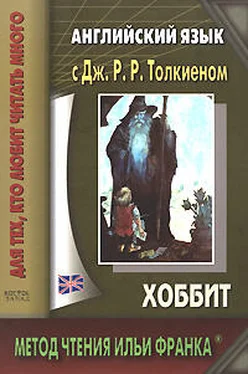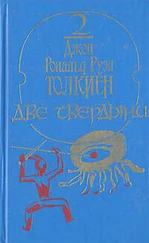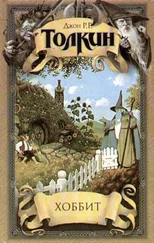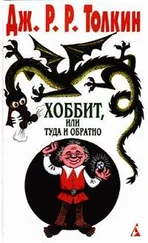Такие книги помогут вам преодолеть важный барьер: вы наберете лексику и привыкнете к логике языка, сэкономив много времени и сил.
Илья Франк, frank@franklang. ru
Chapter 1. An Unexpected Party
(Глава 1. Неожиданные гости)
In a hole in the ground (в норе под землей: «в земле»; hole — дыра, отверстие ) there lived a hobbit (жил-был хоббит). Not a nasty, dirty, wet hole (не в отвратительной, грязной, мокрой норе), filled with the ends of worms (заполненной хвостами червей; end — конец, край ) and an oozy smell (и затхлым запахом тины; oozy — илистый, влажный ), nor yet a dry, bare, sandy hole (но и не в сухой, голой, песчаной норе) with nothing in it to sit down on (в которой нет ничего, на чем /можно/ посидеть) or to eat (или /что можно/ съесть): it was a hobbit-hole (это была нора хоббита), and that means comfort (а это значит — комфортная /нора/; comfort — утешение, успокоение; уют ).
It had a perfectly round door (у нее была совершенно круглая дверь) like a porthole (как иллюминатор), painted green (выкрашенная в зеленый цвет), with a shiny yellow brass knob (с отполированной желтой медной круглой ручкой; shiny — ясный, солнечный, начищенный ) in the exact middle (точно по середине). The door opened on (дверь открывалась /и вела/; to open on — вести куда-либо /о двери/) to a tube-shaped hall (в зал, в форме трубы) like a tunnel (похожий на туннель): a very comfortable tunnel (в очень благоустроенный туннель) without smoke (без копоти; smoke — дым, курение ), with panelled walls (с обшитыми панелями стенами), and floors tiled and carpeted (и полом, покрытым кафельной плиткой и ковром), provided with polished chairs (обставленный полированными стульями ; to provide with — снабжать, обеспечивать ), and lots and lots of pegs for hats and coats (и с множеством и множеством крючков для шляп и пальто) — the hobbit was fond of visitors (хоббит очень любил гостей).
hobbit [ˈhɔbɪt] tunnel [ˈtʌnl] comfortable [ˈkʌmf (ǝ) tǝb (ǝ) l]
In a hole in the ground there lived a hobbit. Not a nasty, dirty, wet hole, filled with the ends of worms and an oozy smell, nor yet a dry, bare, sandy hole with nothing in it to sit down on or to eat: it was a hobbit-hole, and that means comfort.
It had a perfectly round door like a porthole, painted green, with a shiny yellow brass knob in the exact middle. The door opened on to a tube-shaped hall like a tunnel: a very comfortable tunnel without smoke, with panelled walls, and floors tiled and carpeted, provided with polished chairs, and lots and lots of pegs for hats and coats — the hobbit was fond of visitors.
The tunnel wound on and on (туннель продолжал виться и виться; on — зд. указывает на продолжение действия ), going fairly but not quite straight (ведя почти что, но не совсем прямо) into the side of the hill (в сторону холма) — The Hill (Холма), as all the people for many miles round called it (как все люди на много миль вокруг называли его) — and many little round doors (и много маленьких круглых дверей) opened out of it (открывались наружу /из него/), first on one side (сперва по одной стороне) and then on another (и затем по другой). No going upstairs for the hobbit (никаких хождений вверх /по лестнице/ для хоббита): bedrooms (спальные комнаты), bathrooms (ванные комнаты), cellars (погреба), pantries (кладовые для провизии) (lots of these (множество кладовых: «таковых»)), wardrobes (гардеробные) (he had whole rooms devoted to clothes (у него были целые комнаты, предназначенные для одежды; to devote — посвящать, отдавать целиком )), kitchens (кухни), dining-rooms (столовые), all were on the same floor (все были расположены на одном и том же этаже), and indeed on the same passage (и уж конечно, в одном и том же проходе). The best rooms were all on the left-hand side (все самые лучшие комнаты были с левой стороны) (going in (со стороны входа)), for these were the only ones (так как это были единственные комнаты) to have windows (в которых были окна), deep-set round windows (глубоко посаженные круглые окошки) looking over his garden (входящие на его сад) and meadows beyond (и луга за ним), sloping down to the river (спускающиеся к реке).
cellar [ˈselǝ] wardrobe [ˈwɔ: drǝʋb] meadow [ˈmedǝʋ]
The tunnel wound on and on, going fairly but not quite straight into the side of the hill — The Hill, as all the people for many miles round called it — and many little round doors opened out of it, first on one side and then on another. No going upstairs for the hobbit: bedrooms, bathrooms, cellars, pantries (lots of these), wardrobes (he had whole rooms devoted to clothes), kitchens, dining-rooms, all were on the same floor, and indeed on the same passage. The best rooms were all on the left-hand side (going in), for these were the only ones to have windows, deep-set round windows looking over his garden and meadows beyond, sloping down to the river.
This hobbit was a very well-to-do hobbit (этот самый хоббит был очень обеспеченным хоббитом), and his name was Baggins (и фамилия его была Бэггинс). The Bagginses had lived in the neighbourhood of The Hill (семья Бэггинсов жила в окрестностях Холма; neighbourhood—соседство, близость ) for time out of mind (с незапамятных времен ; mind — ум, разум ), and people considered them very respectable (и люди считали их очень почтенными), not only because most of them were rich (и не только потому, что большинство из них были богаты), but also because they never had any adventures (но также и потому, что они никогда не участвовали ни в каких приключениях) or did anything unexpected (или /никогда не/ делали ничего неожиданного): you could tell what a Baggins would say (можно было сказать, что ответит один из Бэггинсов) on any question (на любой вопрос) without the bother of asking him (не утруждаясь даже спросить его; bother — беспокойство, хлопоты ). This is a story (эта история о том) of how a Baggins had an adventure (как Бэггинс попал в приключения), found himself (и обнаружил внезапно, что он; to find oneself doing smth. — сделать что-либо неожиданно для себя самого ) doing and saying things altogether unexpected (делает и говорит совершенно неожиданные вещи). He may have lost the neighbours’ respect (он, может быть, и потерял уважение соседей), but he gained (но он приобрел) — well, you will see (ну, вы сами увидите) whether he gained anything in the end (приобрел ли он что-нибудь в конце концов).
Читать дальше





